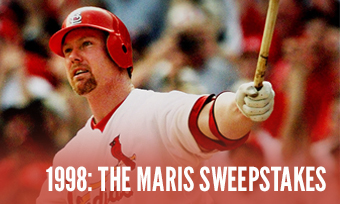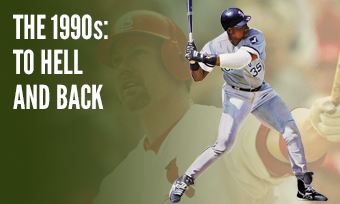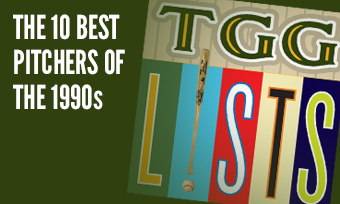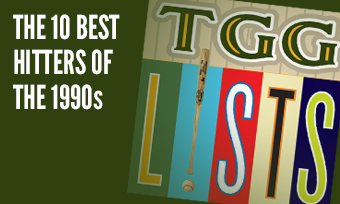The Yearly Reader
Leaders and Honors, 1998
Our list of baseball’s top 10 hitters and pitchers in both the American League and National League for the 1998 baseball season, as well as the awards and honors given to the game’s top achievers of the year.
The National League’s Top 10 Hitters, 1998
Bold type in brick red indicates league leader.
1. Mark McGwire, St. Louis
Key Numbers: .299 average, 130 runs, 70 home runs, 147 RBIs, 162 walks, 28 intentional walks, .470 on-base percentage, .752 slugging percentage.
Among the many accomplishments lost in McGwire’s historic campaign was his becoming the fastest player (by at-bats) to reach 400 career home runs, the first major leaguer to hit 50 in three straight years, and a collection of five different homers measured over 500 feet.
2. Sammy Sosa, Chicago
Key Numbers: .308 average, 134 runs, 198 hits, 66 home runs, 158 RBIs, 171 strikeouts, 18 stolen bases.
Ascending big-time from his days as a shoe-shine boy in has native Dominican Republic for George Bell, Joaquin Andujar and Pedro Guerrero, Sosa may have lost the home run race to McGwire, but easily beat him in the MVP vote—in part because the Cubs made the playoffs and the Cardinals didn’t.
3. Barry Bonds, San Francisco
Key Numbers: .303 average, 120 runs, 44 doubles, 7 triples, 37 home runs, 122 RBIs, 130 walks, 29 intentional walks, 28 stolen bases.
Bonds became the first 400-400 (home runs and steals) major leaguer, but was reportedly preoccupied by being left behind on the McGwire-Sosa opus. His solution: Steroids.
4. Jeff Bagwell, Houston
Key Numbers: .304 average, 124 runs, 33 doubles, 34 home runs, 111 RBIs, 109 walks, 19 stolen bases.
The alleged dead air inside the Astrodome didn’t sap the life out of Bagwell’s performance; he hit .347 with 20 dingers at home.
5. Moises Alou, Houston
Key Numbers: .312 average, 104 runs, 182 hits, 34 doubles, 5 triples, 38 home runs, 124 RBIs, 11 stolen bases.
The 32-year-old son of Expos manager Felipe Alou appeared headed toward career peak form—though it would be interrupted by a full-season absence in 1999 due to a freak ACL injury from stumbling off a treadmill.
6. Larry Walker, Colorado
Key Numbers: 130 games, .363 average, 113 runs, 165 hits, 46 doubles, 23 home runs, 67 RBIs, 14 stolen bases.
Though he accrued roughly only half the home run and RBI totals of a year earlier, Walker still was potent enough to win his first of three NL batting titles over the next four seasons—ending Tony Gwynn’s four-year run at the top.
7. Craig Biggio, Houston
Key Numbers: .325 average, 123 runs, 210 hits, 51 doubles, 20 home runs, 88 RBIs, 23 hit-by-pitches, 50 stolen bases.
The Astros’ leadoff spark collected 50 or more doubles for the first of two consecutive seasons—the first National Leaguer to do that since Joe Medwick in 1936-37.
8. Chipper Jones, Atlanta
Key Numbers: .313 average, 123 runs, 188 hits, 29 doubles, 5 triples, 34 home runs, 107 RBIs, 96 walks, 16 stolen bases.
The switch-hitter hit 32 of his 34 homers batting right-handed; either way, that he focused so well on baseball while he was juggling a myriad of personal issues off the field (including fathering an illegitimate child with a Hooters’ waitress) was pretty impressive.
9. Greg Vaughn, San Diego
Key Numbers: .272 average, 112 runs, 28 doubles, 50 home runs, 119 RBIs, 11 stolen bases.
It’s quite possible that no player blasting 50 homers felt more insignificant than Vaughn in the year of McGwire-Sosa—even as his team, not the Cardinals or Cubs, was the one that made it to the World Series.
10. Andres Galarraga, Atlanta
Key Numbers: .305 average, 103 runs, 27 doubles, 44 home runs, 121 RBIs, 25 hit-by-pitches.
Back at sea level after five years in mile-high Denver, Galarraga proved that altitude wasn’t behind his recent power surge—bruising 40-plus homers for the third straight season.
The American League’s Top 10 Hitters, 1998
1. Albert Belle, Chicago
Key Numbers: 163 games, .328 average, 113 runs, 200 hits, 48 doubles, 49 home runs, 152 RBIs, 15 sacrifice flies, .655 slugging percentage.
The irascible Belle must have really got angry in late June; the fiery White Sox slugger went absolutely nuts in the season’s second half, batting .386 with 33 homers and 92 RBIs.
2. Juan Gonzalez, Texas
Key Numbers: .318 average, 110 runs, 193 hits, 50 doubles, 45 home runs, 157 RBIs.
The year wasn’t a total loss for Hack Wilson, whose league and team home run records were shattered by McGwire and Sosa; his RBI mark of 191 stayed intact after Gonzalez—ahead of pace with over 100 at the All-Star break—cooled off. Still, Gonzalez completed a remarkable four-year run in which he accrued more RBIs (514) than games played (511); eight times in 1998, he knocked in at least five runs for an MLB record—and drove in four runs in another six contests.
3. Ken Griffey Jr., Seattle
Key Numbers: .284 average, 120 runs, 180 hits, 33 doubles, 56 home runs, 146 RBIs, 20 stolen bases.
The Kid became the first player since Babe Ruth (in 1927-28) to hit over 50 homers in back-to-back years—and the second youngest after Jimmie Foxx to reach 300 for his career. (Alex Rodriguez would surpass both Griffey and Foxx in 2003.)
4. Alex Rodriguez, Seattle
Key Numbers: .310 average, 686 at-bats, 123 runs, 213 hits, 35 doubles, 5 triples, 42 home runs, 124 RBIs, 10 hit-by-pitches, 46 stolen bases.
After a relatively sluggish off-year in 1997, A-Rod became the third player to hit 40 homers and steal 40 bases in the same season.
5. Manny Ramirez, Cleveland
Key Numbers: .294 average, 108 runs, 35 doubles, 45 home runs, 145 RBIs.
Perhaps inspired by the McGwire-Sosa race, Ramirez belted 30 of his home runs over the season’s final three months; his voluminous RBI total began an eight-year run in which he averaged 130 per year.
6. Mo Vaughn, Boston
Key Numbers: .337 average, 107 runs, 205 hits, 31 doubles, 40 home runs, 115 RBIs.
Before taking his monster act via free agency to Anaheim, Vaughn narrowly missed claiming the AL batting title (Bernie Williams topped him by two points) and collected both 200 hits and 40 homers for the second time.
7. Nomar Garciaparra, Boston
Key Numbers: .323 average, 111 runs, 195 hits, 37 doubles, 8 triples, 35 home runs, 122 RBIs, 12 stolen bases.
It took the Red Sox a year-plus, but they finally realized that Garciaparra was better suited for the 3 or 4 spot in the lineup rather than leadoff; he responded with a career-high total in home runs.
8. Carlos Delgado, Toronto
Key Numbers: .292 average, 94 runs, 43 doubles, 38 home runs, 115 RBIs, 11 hit-by-pitches.
The emerging Puerto Rico-born slugger hit half of his 38 home runs after August 4—starting with his first of five career hat tricks.
9. Jim Thome, Cleveland
Key Numbers: 123 games, .293 average, 89 runs, 34 doubles, 30 home runs, 85 RBIs, 89 walks.
Even with a five-week absence due to a broken hand in August, Thome still retained a streak of 30 or more homers per season that would last nine years.
10. Bernie Williams, New York
Key Numbers: 128 games, .339 average, 101 runs, 30 doubles, 5 triples, 26 home runs, 97 RBIs, 15 stolen bases.
Williams won his lone batting crown thanks to the sun; he hit .423 in 43 day games.
The National League’s Top 10 Pitchers, 1998
1. Kevin Brown, San Diego
Key Numbers: 2.38 ERA, 18 wins, 7 losses, .720 win percentage, 35 starts, 257 innings, 49 walks, 10 wild pitches, 10 hit-by-pitches.
Handed over by the Marlins for what basically was a season-long rental by the Padres, Brown lost a bid for his second no-hitter in as many years when he gave up a two-out, seventh-inning hit to Milwaukee on August 16. But he struck it rich in the offseason to follow by inking a record deal with the Dodgers.
2. Greg Maddux, Atlanta
Key Numbers: 2.22 ERA, 18 wins, 9 losses, 5 shutouts, 34 starts, 251 innings, 45 walks, 28 stolen bases allowed, 21 grounded into double plays.
While sluggery was the definitive theme for baseball in 1998, Maddux quietly copped his fourth and last ERA crown of his Hall-of-Fame career.
3. Tom Glavine, Atlanta
Key Numbers: 2.47 ERA, 20 wins, 6 losses, .769 win percentage, 33 starts, 229.1 innings, 20 grounded into double plays.
Winning his second Cy Young Award, Glavine led a quintet of Atlanta pitchers who grouped to become the first to each win at least 16 since the 1923 Yankees.
4. Trevor Hoffman, San Diego
Key Numbers: 1.48 ERA, 4 wins, 2 losses, 53 saves, 1 blown save, 66 appearances, 73 innings, 8 wild pitches.
Jacked up by AC-DC’s Hell’s Bells—played as his entry music for the first time by the Padres in 1998—the venerable Padres closer set a career mark in saves (blowing just one opportunity) and finished a close second to Tom Glavine in the NL Cy Young vote, all despite earning two more first-place votes.
5. Al Leiter, New York
Key Numbers: 2.47 ERA, 17 wins, 6 losses, 28 starts, 193 innings, 11 hit-by-pitches, 24 grounded into double plays.
Another Marlins refugee, Leiter curbed the walks (71, after averaging over 100 the previous three seasons) and produced a personal-best ERA.
6. John Smoltz, Atlanta
Key Numbers: 2.90 ERA, 17 wins, 3 losses, .850 win percentage, 26 starts, 167.2 innings.
Despite worsening elbow pain, Smoltz continued to provide discomfort for opponents. Outside of three wobbly starts against the Astros, he was 16-0 with a 2.26 ERA against NL competition.
7. Robb Nen, San Francisco
Key Numbers: 1.52 ERA, 7 wins, 7 losses, 40 saves, 5 blown saves, 78 appearances, 88.2 innings, 10 stolen bases allowed.
Judging from his performance at San Francisco, Nen—along with ex-Marlins teammates Kevin Brown, Moises Alou and Al Leiter—might have brought Florida another championship had they been allowed to stay.
8. Omar Daal, Arizona
Key Numbers: 2.38 ERA, 4 wins, 2 losses, 42 saves, 7 blown saves, 78 appearances, 94.2 innings, 12 walks.
The Venezuelan-born Daal was a struggling reliever in six major league years prior to a brief but largely impressive tenure with Arizona; only the Brewers’ Steve Woodard had worst run support per start.
9. Ugueth Urbina, Montreal
Key Numbers: 1.30 ERA, 6 wins, 3 losses, 34 saves, 4 blown saves, 64 appearances, 69.1 innings.
The only major leaguer ever to claim the initials UU—even his middle name starts with a “U” (Urtain)—Urbina flourished in his second year as Montreal closer, with opponents batting a miniscule .157 against him.
10. Curt Schilling, Philadelphia
Key Numbers: 3.25 ERA, 15 wins, 14 losses, 35 starts, 15 complete games, 268.2 innings, 300 strikeouts, 12 wild pitches.
The workhorse of the year, Schilling recorded the most complete games (15) of any NL pitcher during the 1990s; nobody has come close since.
The American League’s Top 10 Pitchers, 1998
1. Roger Clemens, Toronto
Key Numbers: 2.65 ERA, 20 wins, 6 losses, .769 win percentage, 33 starts, 234.2 innings, 271 strikeouts, 28 stolen bases allowed.
The Rocket finished his dominant two-year tenure with the Blue Jays—finishing the season with a 15-game winning streak and a career-best streak of consecutive scoreless innings (34.1).
2. Pedro Martinez, Boston
Key Numbers: 2.89 ERA, 19 wins, 7 losses, .731 win percentage, 33 starts, 233.2 innings.
Martinez brilliantly filled the intimidating star void created two years earlier by Clemens’ defection to Toronto—and this was mere prologue to what was to come over the next five seasons.
3. Kenny Rogers, Oakland
Key Numbers: 3.17 ERA, 16 wins, 8 losses, 34 starts, 238.2 innings, 34 grounded into double plays.
There was no place like home for Rogers, 11-0 on the A’s home turf to help give Oakland its first 10-game winner in three years.
4. David Wells, New York
Key Numbers: 3.49 ERA, 18 wins, 4 losses, .818 win percentage, 30 starts, 5 shutouts, 214.1 innings, 29 walks.
The dream season for the hefty 35-year old, with a perfect game and a World Series ring; not bad for a guy who, a year earlier, overcame a broken hand from a brawl and a chronic case of gout.
5. Tom Gordon, Boston
Key Numbers: 2.72 ERA, 7 wins, 4 losses, 46 saves, 1 blown save, 73 appearances, 79.1 innings.
After blowing a save on April 16 against Oakland, the first-year Red Sox closer wouldn’t blow another until June 5 of the following year—a record 54 opportunities later. (Eric Gagne would cruise past the mark in 2003.)
6. John Wetteland, Texas
Key Numbers: 2.03 ERA, 3 wins, 1 loss, 42 saves, 5 blown saves, 63 appearances, 62 innings.
The former Expos/Yankees closer continued to shine in the midst of a four-year stay in Arlington that would make him the Rangers’ all-time saves leader.
7. David Cone, New York
Key Numbers: 3.55 ERA, 20 wins, 7 losses, .741 win percentage, 31 starts, 207.2 innings, 15 hit-by-pitches, 21 stolen bases allowed.
By winning his last start of the year, Cone became the first (and still, only) pitcher to have 20-win seasons for both the Mets and Yankees on his resume.
8. Mike Mussina, Baltimore
Key Numbers: 3.49 ERA, 13 wins, 10 losses, 29 starts, 206.1 innings, 41 walks, 10 wild pitches, 20 stolen bases allowed.
A tough but still effective year for Mussina, whose nose was broken on a return line drive in mid-May—costing him over three weeks of action.
9. Mariano Rivera, New York
Key Numbers: 1.91 ERA, 3 wins, 0 losses, 36 saves, 5 blown saves, 54 appearances, 61.1 innings.
In his second full year as Yankees closer, Rivera posted a sub-2.00 ERA. There’d be many more where that came from.
10. Bartolo Colon, Cleveland
Key Numbers: 3.71 ERA, 14 wins, 9 losses, 31 starts, 204 innings.
Light, at the time, on pounds and even light on the years—his age was listed at 24 on Opening Day when in actuality he was 22—Colon began fattening up on a stat sheet that would wrap 20 years later with 247 lifetime victories.









